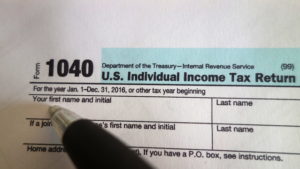
Tax returns, now a presidential campaign issue
House Democrats yesterday formally requested Donald Trump‘s 2013 through 2018 personal tax returns, as well as the tax returns of eight Trump business entities, from the Internal Revenue Service. At the same time, an increasing number of Democratic presidential candidates have already released multiple prior years of tax returns, but U.S. Senator Bernie Sanders remains the outlier.
The reason for requesting presidential candidates’ tax returns comes down to one word: transparency. According to McClatchy DC, “[t]he returns provide voters a look into the personal finances and charitable contributions of candidates and gives insight into whether he or she has any potential conflicts of interest.” Paraphrasing Joseph Thorndike, author and Director of the Tax History Project at Tax Analysts, McClatchy indicates that, “[w]ithout the full returns, voters can’t see such items as sources of income, which tax breaks they claimed, what they might have deducted as business expenses or how much they gave to charity.” Accordingly, while releasing tax returns is not required by law, it has become a tradition for presidential candidates to do so since Richard Nixon in the early 1970s.


